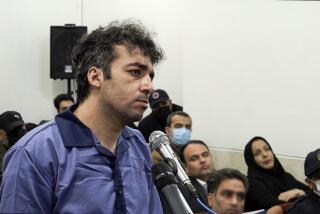China Presses Deadly Crime Crackdown
- Share via
BEIJING — Worried about spiraling crime rates, China is carrying out a law enforcement crackdown that has seen many hundreds of people executed since the beginning of the year.
At least 1,781 people were put to death in the last three months--more than were believed executed in China all of last year, the human rights group Amnesty International reported Friday.
The executions are part of China’s toughest campaign in five years against crime, which has risen sharply during that time as gaps in income widen, workers are laid off from failing state enterprises and residents become more mobile.
Although violent crime is still far less common here than in the United States, many Chinese are increasingly dissatisfied with the state of public safety.
Beijing’s “Strike Hard” campaign comes as the country enters a period of tightening across the board, from a clampdown on the Internet and the news media to the detention of several American or U.S.-based scholars on espionage charges.
China’s Communist Party is eager to be seen as firmly in control as it marks the 80th anniversary of its founding and gears up for a shuffling of the top leadership next year.
The regime is also aware that widespread corruption threatens the government’s legitimacy. The leadership wants to show that it is trying hard to solve the problem, using harsh punishment as a deterrent.
Many of those executed over the last few months were not violent felons; they were accused of economic crimes such as tax fraud, bribery and counterfeiting. Other offenses that earned the death penalty included drug dealing, pandering and even reckless driving, Amnesty International said.
The London-based group criticized the “execution frenzy” and said such measures do little to lessen crime.
Critics point out that criminal activity in China has continued to rise since the 1996 Strike Hard campaign, even though more than 4,000 people were reported executed that year.
The number of crimes earmarked for police investigation has soared by 50% since 1999, the state-run New China News Agency said in March. Organized crime, often involving high-ranking government officials, shot up seven times within the same period.
The latest Amnesty International statistics on executions were compiled by monitoring Chinese media accounts and individual cases. In the last three months, 2,960 people were sentenced to death, with 1,781 executed, the group said, adding that the real numbers are likely to be much higher because many cases go unreported. The Chinese government refuses to release information on the number of executions, calling it a “state secret.”
“These figures are really the bare minimum,” said Catherine Baber, a researcher with Amnesty International in Hong Kong.
By comparison, the United States--widely criticized for its use of capital punishment--executed 25 people over the last three months. China’s population, at 1.3 billion, is about five times that of the U.S.
Executions in China are performed by a bullet to the back of the head, although some areas are experimenting with lethal injection.
The report was released a week before the International Olympic Committee is due to announce which city will host the 2008 Summer Games. Beijing, which has mounted an all-out effort to win the Olympics, is considered the favorite.
On Wednesday, the European Parliament passed a resolution opposing China’s bid, citing as one reason the nation’s “frequent imposition of capital punishment”--although observers noted that a prominent European capital, Paris, is competing for the Games. The European Union has made elimination of the death penalty one of its top human rights goals.
In Washington, the Bush administration has stayed neutral on Beijing’s Olympic aspirations. And as a rule, the U.S., as a fellow practitioner of capital punishment, refrains from criticizing other countries for putting criminals to death--including China, which executes more people each year than the rest of the world combined.
During the present crackdown, local police forces have rushed to show themselves tough on crime and quick to catch villains. In the southern province of Hunan, authorities bragged of solving 3,000 cases within two days in April, raising fears among critics that due process was tossed aside.
“The potential for miscarriages of justice, arbitrary sentencing and the execution of innocent people is immense,” Amnesty International said.
The Beijing regime has tried to modernize its legal system, instituting new safeguards such as Miranda-type rights for suspects and a stronger presumption of innocence for defendants. To ensure that no one is wrongly put to death, all capital cases are supposed to be reviewed by China’s highest court, here in Beijing.
But in practice, many such cases never reach the capital, and police on the ground--who are often ill-equipped, ill-funded and ignorant of central government rules--routinely fail to adhere to due process. Human rights groups say that torture and police abuse are widespread.
The Chinese government puts great stock in swift punishment, particularly in high-profile cases that can serve as stern warnings to the masses.
In March, for example, authorities launched a nationwide manhunt for a disgruntled worker suspected of setting off bombs and killing more than 100 people at workers’ dormitories in the northern city of Shijiazhuang. The suspect was captured, tried, sentenced and executed within weeks; so was the woman accused of selling him the explosives.
China’s leaders hope that such examples will deter other would-be criminals and maintain social stability, especially as Beijing prepares to enter the World Trade Organization by early next year, which could result in massive layoffs and greater discontent.
Public support of the death penalty runs high in China. A survey six years ago by the Chinese Academy of Social Sciences found that 97% of respondents favored capital punishment.
In recent years, however, a number of Chinese scholars have recommended that the government reduce the death penalty’s scope. At present, 68 types of offenses, including many nonviolent ones, can command the death penalty--up from 28 in 1979.
More to Read
Sign up for Essential California
The most important California stories and recommendations in your inbox every morning.
You may occasionally receive promotional content from the Los Angeles Times.














